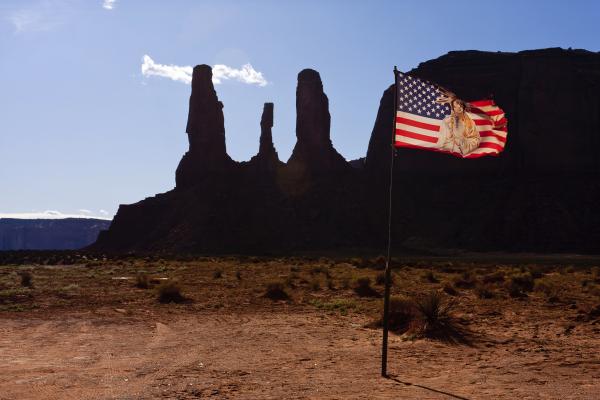On April 29, in response to an interview question on CNN regarding the expected political and personal attacks from Donald Trump in a general election, Hillary Clinton stated that she has experience "dealing with men who sometimes get off the reservation..."
"Off the reservation" is a term deeply rooted in the implicit racial bias of the United States of America. Reservations are federal lands where Native peoples were herded before and after the Indian Removal Act passed by the United States Congress in 1830. Reservations are where our people were moved to during forced relocation like the "Trail of Tears" (Cherokee) and the "Long Walk" (Navajo). Reservations are not owned by Native people or tribes. They are lands held in trust for us by the United States' federal government because we only have the right of occupancy to the land — whereas white Europeans have the "right of discovery" and, therefore, the true title to the land.
When Natives are “on the reservation,” it is implied that we are contained, isolated, and controlled. When we go "off the reservation," chaos ensues. We have gone rogue, act unpredictably, and are causing trouble.
"In its literal and original sense, as you would expect, the term was used in the 19th century to describe the activities of Native Americans," wrote NPR librarian Kee Malesky in 2014:
"The acting commissioner of Indian affairs to-day received a telegram from Agent Roorke of the Klamath (Oregon) agency, dated July 6, in which he says: 'No Indians are off the reservation without authority. All my Indians are loyal and peaceable, and doing well.'" (Baltimore Sun, July 11, 1878)
"Secretary Hoke Smith...has requested of the Secretary of War the aid of the United States troops to arrest a band of Navajo Indians living off the reservation near American Valley, New Mexico, who have been killing cattle, etc." (Washington Post, May 23, 1894)
"Apaches off the reservation...killing deer and gathering wild fruits." (New York Times, Sept. 7, 1897)
Many of the news articles that used the term in a literal sense in the past were also expressing undisguised contempt and hatred, or, at best, condescension, for Native Americans — "shiftless, untameable...a rampant and intractable enemy to civilization" (New York Times, Oct. 27, 1886).
But I would not expect Hillary Clinton or Donald Trump to understand this. They are the essence of the typical establishment American candidates: experts in the art of mythologizing American history, and well-trained to speak the carefully constructed code language of American exceptionalism. The American mythology teaches that these lands were "discovered," instead of conquered or stolen. And the language of exceptionalism refers to the 19th century as periods of "manifest destiny" and "Westward expansion" — rather than more accurately acknowledging that the United States ethnically cleansed this land to make way for American settlers.
Both Donald Trump and Hillary Clinton have been taught to not read the entire Declaration of Independence, lest they learn that the very declaration this country holds as sacred, is actually a racist document, which, 30 lines below the statement "All men are created equal," dehumanizes Natives as "merciless Indian savages." They have been trained to not ask about the dehumanizing legal instrument (Doctrine of Discovery) or the racist legal precedent (Johnson v. M'Intosh, 1823) that the Supreme Court of the United States used to establish the basis for land titles in this country.
In these last eight months, many in our nation have rightly identified the narcissistic words and actions of Donald Trump as offensive, childish, ignorant, and even racist. Unfortunately, most have not understood the deeper implications of his rhetoric. Donald Trump understands what made America "great" — explicit and systemic racism.
One cannot discover lands that are already inhabited. That action is more accurately referred to as conquering or stealing. The notion that America was discovered is a racist colonial concept that assumes the dehumanization of indigenous peoples. Throughout the 19th century, the United States of American was in a constant state of warfare against native peoples: the Trail of Tears, the massacre at Sand Creek, the Long Walk, the massacre at Wounded Knee, the hanging of the Dakota 38 (the largest mass execution in the history of the U.S.), the Seminole Wars, the Navajo Wars, the Puget Sound War, the Comanche Campaigns, the Nez Pierce War, the Pine Ridge Campaign — just to name a few. American expansion is merely a code word for genocide and ethnic cleansing.
And in a country that gave 20 Congressional Medals of Honor to the soldiers who participated in the massacre at Wounded Knee (1890) and to this day refuses to rescind them, it is normal — even expected — that a leading candidate for the office of president of the United States would thoughtlessly use the phrase "off the reservation."
A few months ago, President Obama, in his final State of the Union address, referenced the preamble to the Constitution when he said, "'We the People.' Our Constitution begins with those three simple words, words we’ve come to recognize mean all the people..."
When I heard that I said to myself, "Really? All the people? When did we decide that? I must not have gotten the memo. Did SCOTUS change the legal precedent for land titles?"
The definition of “We the People” is the very debate that is taking place in the presidential campaigns today. Donald Trump seems to be advocating at the top of his lungs that "We the People" does not include Muslims, immigrants, women, and, based on the obscene amount of money he has made buying and selling land in the United States, definitely not Natives.
Hillary Clinton, on the other hand, is using terms like "off the reservation," and reassuring people that “We don’t need to make America great again. America never stopped being great," demonstrating that she does not understand the systemic racism and blatant oppression that has been endured by people of color throughout the entire history of this nation.
Unfortunately, the dialogue that is taking place this election cycle is not about broad-based equality or ending racism. The conversation we are having today is about the type of racism we want to settle for. Do we want Hillary Clinton to work to keep racism as our nation’s implicit bias, or allow Donald Trump to champion racism as our explicit bias? After all, isn't building a wall, banning Muslims, and personally funding a presidential campaign with a fortune made by buying and selling land that has been ethnically cleansed merely the fruit of a country that has learned all too well how to deal with the "merciless Indian savages" who sometimes get "off the reservation?"
This post originally appeared at Reflections from the Hogan.
Got something to say about what you're reading? We value your feedback!

